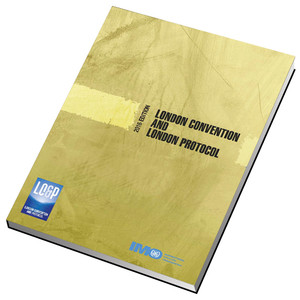
This publication is intended for guidance purposes only and to assist national administrations in implementing the London Protocol, whether they are currently Contracting Parties or simply interested in becoming Parties.
This Guidance describes what action States should take at the national level to fully implement the provisions of the London Protocol. It may also benefit officials in countries, who are seeking support to develop or enhance their measures implementing the Protocol, particularly with regard to their domestic legislative and other measures to implement the Protocol.
In 2015, the governing body of the London Protocol approved work to revise the Guidance on National Implementation document, with a view to increasing ratifications of the London Protocol. This Guidance replaces the Guidance on the National Implementation of the 1996 Protocol to the London Convention 1972, which was adopted in 2001.
The importance of increased ratification is clear: at the time of publication of this guidance, only 51 States had ratified or acceded to the Protocol, and three of the 18 Contracting Parties to the Convention that were signatories to the London Protocol had not yet ratified it. Within the governing body of the London Protocol, there has been increasing concern for the low annual increase of accessions to and ratifications of the Protocol. The Strategic Plan for the London Convention and London Protocol, adopted by the Contracting Parties in 2016, includes four strategic directions, one of which is to ‘promote the ratification of or accession to the London Protocol.’ This strategic direction is, in turn, supported by four actions, including ‘provide for specific technical and legal assistance and support countries wishing to ratify or accede to the London Protocol.’
This Guidance describes what action States should take at the national level in order to fully implement the provisions of the Protocol. It may also benefit officials in countries, regardless of whether they are currently Parties to the London Protocol, who are seeking support to develop or enhance their measures implementing the Protocol, particularly with regard to their domestic legislative and other measures to implement the Protocol.
This document only constitutes guidance and is intended to assist national administrations in implementing the London Protocol, whether they are currently Contracting Parties or simply interested in becoming Parties. It is not to be construed as providing definitive interpretations of the Protocol or how its provisions should be applied. It remains at all times the prerogative of Contracting Parties to interpret the obligations to which they
have become bound under the Protocol.
Readers may wish to note that the text alongside the grey bar contains the text of the London Protocol and text without the grey bar constitutes the revised guidance on the national implementation of the London Protocol.
The 1996 London Protocol to the Convention on the Prevention of Marine Pollution
by Dumping of Wastes and Other Matter, 1972
The benefits of being a Contracting Party to the Protocol
Implementation
The importance of implementation
Monism and dualism
Implementation by binding norms
Existing laws
Minimum set of obligations to be implemented by binding norms
Checklist for the legislator
Imposition of a stricter regime at national level
Amendments to the Protocol
Article 21.5 Ratification after entry into force of an amendment
The general rule
The exception to the general rule when two thirds of Contracting Parties agree
Amendments that have not entered into force at the time a State becomes a Contracting Party
Relationship between the revised guidance and other key documents
Article 1 Definitions
Article 2 Objectives
Article
3
General
obligations
Article
4
Dumping
of
wastes
or
other
matter
Article 5 Incineration at sea
Article 6 Export of wastes or other matter
Article 7 Internal waters
Article 8 Exceptions
Article 9 Issuance of permits and reporting
Article 10 Application and enforcement
Article 11 Compliance procedures
Article 12 Regional cooperation
Article 13 Technical cooperation and assistance
Annex 1 Wastes or other matter that may be considered for dumping
Annex 2 Assessment of wastes or other matter that may be considered for dumping
2006 amendment of the Protocol
Are there special issues to be considered for implementation?
Implement by binding norms?
Other information
2009 amendment of the Protocol
Are there special issues to be considered for implementation?
Implement by binding norms?
Other information
Examples
2013 amendment of the Protocol
Are there special issues to be considered for implementation?
Implement by binding norms?
Other information
Appendix
The
legislator’s
checklist
A??s a specialized agency of the United Nations, IMO is the global standard-setting authority for the safety, security and environmental performance of international shipping. Its main role is to create a regulatory framework for the shipping industry that is fair and effective, universally adopted and universally implemented.
In other words, its role is to create a level playing field so that ship operators cannot address their financial issues by simply cutting corners and compromising on safety, security and environmental performance. This approach also encourages innovation and efficiency.
Shipping is a truly international industry, and it can only operate effectively if the regulations and standards are themselves agreed, adopted and implemented on an international basis. IMO is the forum at which this process takes place.
- Number of Pages:
- 54
- ISBN:
- 9789280116809
- Published Date:
- April 2019
- Book Height:
- 250 mm
- Book Width:
- 210 mm
- Author:
International Maritime Organization
- Preview:
- Yes




